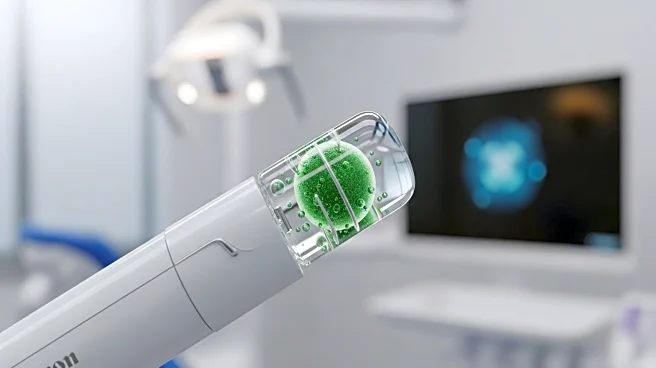What's Happening?
A research team has developed a dental composite resin incorporating green synthesized titanium dioxide nanoparticles derived from Vitis vinifera extract. The study involved synthesizing titanium dioxide nanoparticles using grape seed extract, which were then integrated into a dental composite resin. The composite was tested for antimicrobial properties against oral bacteria such as Streptococcus mutans, Streptococcus sanguinis, and Lactobacillus acidophilus. The nanoparticles demonstrated significant improvements in antibacterial and mechanical properties without negatively affecting the curing process or material integrity. The research highlights the potential of using environmentally friendly methods to enhance dental materials.
Why It's Important?
The development of this antimicrobial dental composite is significant for the dental industry, as it offers a sustainable and effective solution to combat oral bacterial infections. By using green synthesis methods, the research addresses environmental concerns associated with traditional nanoparticle production, which often involves toxic reagents and high energy consumption. The enhanced antibacterial properties of the composite could lead to improved dental health outcomes, reducing the prevalence of dental caries and other oral diseases. This innovation may also influence future research and development in dental materials, encouraging the adoption of eco-friendly practices.
What's Next?
Further research and clinical trials are likely needed to validate the efficacy and safety of the composite resin in real-world dental applications. If successful, this could lead to commercial production and widespread use in dental practices, potentially setting a new standard for dental materials. Stakeholders such as dental product manufacturers and healthcare providers may explore partnerships to bring this innovation to market. Additionally, the study may inspire further exploration into green synthesis techniques for other medical applications, broadening the impact of sustainable practices in healthcare.
Beyond the Headlines
The use of green synthesized nanoparticles in dental composites not only addresses environmental concerns but also opens up discussions on the ethical implications of sustainable practices in medical research. This development could lead to a shift in industry standards, promoting the use of eco-friendly materials across various sectors. The long-term impact may include increased consumer demand for sustainable products, influencing market trends and regulatory policies.








